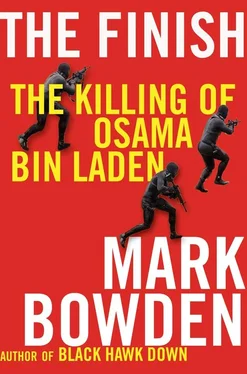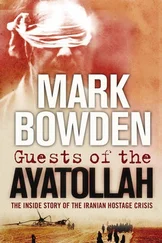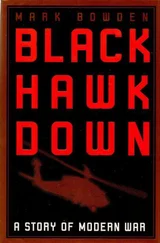Obama is a cautious man, and in the days after the attacks his caution showed. He seemed more interested than provoked. He said he hoped America would “draw some measure of wisdom from this tragedy.” He sounded more inclined to study the attack than to avenge it. Here was a man whose blood had a higher boiling point than most. He saw himself as someone skilled at navigating between implacable extremes, be they cultural or, as with his work with the Harvard Law Review , intellectual. But in this instance, the forces he imagined had shaped the 9/11 attackers, ignorance and poverty, did not apply. The suicidal killers would turn out to be neither embittered sons of poverty nor especially hopeless or ignorant. Most were well-to-do young Saudis whose families had shipped them overseas for expensive college educations. They were religious fanatics, led by a man who had inherited a fortune. Their grievances were not economic—they were political and religious.
Obama did call for some martial response, but even in that he was careful. “We must be resolute in identifying the perpetrators of these heinous acts and dismantling their organizations of destruction,” he said. Not “find them and arrest or kill them,” but dismantle their organizations. If Bush’s response to the attacks started big and would keep getting bigger, his eventual successor’s response was at the opposite end of the spectrum. Any thoughts about war for Obama were deeply couched in restraint. He would eventually wage war fiercely, but the restraint would remain. He was not a pacifist. He saw violence as a necessary resort, albeit a last one. But as long as he was not bearing the responsibility of defending the nation, he could afford to let the shocking events of the day sink in more slowly.
The events were unprecedented. America has had its share of bloodshed, invasion, and surprise attack. Pearl Harbor was a living memory for millions. But because of television, nothing in American history compared with the impact of 9/11. Pearl Harbor was over two thousand miles from the mainland, at a time when the Hawaiian islands were just an American territory. Reports of the Japanese attack arrived via radio and newspaper stories. The attacks on 9/11 happened on live TV and were broadcast worldwide, the key moments replayed in slow motion and in a constant loop. There was nothing indirect about this. Here was heedless slaughter of fellow citizens right before our eyes.
The debates over conflicts in Obama’s lifetime—Panama, El Salvador, Kuwait, Somalia, Rwanda, Bosnia, etc.—had all involved abstract questions about the use of American power. What was the country’s moral obligation? How broadly should “national interest” be defined? What were the costs of intervention? Would it make things better or worse? How would the rest of the world perceive the decision? There was nothing abstract about 9/11.
Some persistent critics of the United States would argue that the country had brought this on itself. They would blame, among other things, self-serving Middle East policies, attitudes of cultural supremacy, and a steadfast disregard for growing global disparities in wealth and opportunity. Obama’s own statements hinted at this. But it was apparent to most that the attacks were rooted in something darker. Washington’s global strategies, intrigues, and alliances stirred anger in many parts of the world, particularly the Middle East. Anti-Americanism was real and dangerous. But this… this went to some deep well of hatred. The death of innocents has always been a tragic consequence of war, but this was random murder as strategy. It was something new, or, perhaps, something very old.
Obama sat up late on the night of 9/11 watching TV while he cared for infant Sasha, changing her and then giving her a bottle. By then the links with al Qaeda were being widely reported, and screens flashed pictures of bin Laden, a tall, thin, lordly man with a prophet’s beard and flowing robes. His picture conjured up wrathful images of the fanatical abolitionist John Brown, or even Jehovah. Obama already knew more about this Saudi Arabian renegade and his extremist movement than did most Americans. The explosions at U.S. embassies in Kenya and Tanzania in 1998 had killed 223 people, mostly Africans. Thousands more had been wounded. Obama had family in Kenya. He had visited that Nairobi embassy. His tendency to search for answers through mutual understanding would be sorely tested here.
It would end up mattering a great deal how the events of this day affected Barack Obama. Few of us are asked to make life and death decisions, or to order someone killed. It is doubtful that Obama, on that night, imagined that he ever would. His personal and intellectual inclination was to bridge the gaps between people, to empathize. He tended to see conflict as something that arose exclusively out of injustice and misunderstanding. He was the son of a Luo tribesman from Kenya and a white girl from Kansas. He was different wherever he went, as a boy making the transition to life and school in Jakarta, as a young interracial man with black skin in a primarily white world. Even internally, negotiating differences was his life story. As he would tell biographer David Maraniss years later, “The only way my life makes sense is if, regardless of culture, race, religion, tribe, there is this commonality, precepts that are universal. And that we can reach out beyond our differences. If that is not the case, then it is pretty hard for me to make sense of my life. So that’s the core of who I am.” Empathy was his milieu. It’s a generous worldview, and often the correct one.
But on September 11 he confronted something that challenged that hopeful insight. Search as he might for some logic to justify or mitigate these attacks, no reach of empathy or reason got him there. Bin Laden’s hateful beliefs could not be reconciled. Despite the soft tone of his remarks to the Hyde Park newspaper, Obama also spoke of “a fundamental absence of empathy on the part of the attackers: an inability to imagine, or connect with, the humanity and suffering of others.”
There is little evidence that George W. Bush was given to this sort of reflection, at least not openly, about himself or his responsibility. He had been born into a family that wielded power as if it were part of its birthright, and when the attacks came he was more than ready to play his role. Obama came from an opposite place. His roots were among the powerless. But even in his wide experience there was no way to comprehend Osama bin Laden.
Four years after the attacks, after his election to the U.S. Senate sparked a wave of electoral enthusiasm that would eventually carry him to the White House, Obama wrote a new prologue to his memoir. In it, he returned briefly to 9/11: “It’s beyond my skill as a writer to capture that day and the days that would follow. The planes like specters vanishing into steel and glass, the slow-motion cascade of towers crumbling into themselves. The ash-covered figures wandering the streets. The anguish and fear. Nor do I pretend to understand the stark nihilism that drove terrorists that day and drives their brethren still. My powers of empathy, my ability to reach into another’s heart cannot penetrate the blank stares of those who would murder innocents with abstract, serene satisfaction.”
He noted that the murderous swath of al Qaeda in the previous decade hewed oddly close to his own life path—Nairobi, Bali, Manhattan. He spoke more harshly of the attackers than he had years earlier. He condemned anyone “who would seek under whatever flag or slogan or sacred text, a certainty and simplification that justifies cruelty toward those not like us.”
Obama had spent a lifetime, no matter where he looked, being not like others. The attacks had crystallized something for him.
Читать дальше












